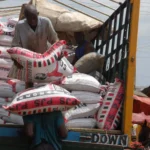The United Nations Children’s Fund (UNICEF) has warned that about 190 million children in ten African countries face high risk from inadequate water, sanitation, and hygiene (WASH)-related diseases and climate hazards.
Development Diaries reports that these statistics were obtained from a study released before the UN Water Conference.
The study reviewed household access to WASH services, the burden of WASH-attributable deaths among children under five, and exposure to climate and environmental hazards.
SDG Six: Ensure availability and sustainable management of water and sanitation for all
The UNICEF study further revealed where children face the biggest threat, and where investment in solutions is desperately needed to prevent unnecessary deaths.
‘Africa is facing a water catastrophe. While climate and water-related shocks are escalating globally, nowhere else in the world do the risks compound as severely for children’, UNICEF Director of Programmes, Sanjay Wijesekera, said.
‘Devastating storms, floods, and historic droughts are already destroying facilities and homes, contaminating water resources, creating hunger crises, and spreading disease.
‘But as challenging as the current conditions are, without urgent action, the future could be much more bleak’.
According to the UNICEF study, the triple threat was found to be most acute in Benin, Burkina Faso, Cameroon, Chad, Ivory Coast, Guinea, Mali, Niger, Nigeria, and Somalia.
It further stated that many of the worst-affected countries, particularly in the Sahel, are also facing instability and armed conflict, further aggravating children’s access to clean water and sanitation.
It is understood that as a result, these countries carry the heaviest burden of child deaths from diseases caused by inadequate WASH.
A 2022 UNICEF report revealed that 418 million people in Africa still lack even a basic level of drinking water service, 779 million lack basic sanitation services (including 208 million who still practice open defecation) and 839 million still lack basic hygiene services.
According to research, about 70 percent of rural water schemes in Africa are non-functional or intermittently functional at any given time resulting in compromised human well-being
Furthermore, due to poor WASH practices in Africa, about 28 percent of the population in the region still practice open defecation.
Development Diaries calls on the governments of these African countries to take urgent action in e ensuring that affected people, many of whom are children, access safe drinking water.
Source: UN
Photo source: UNICEF




